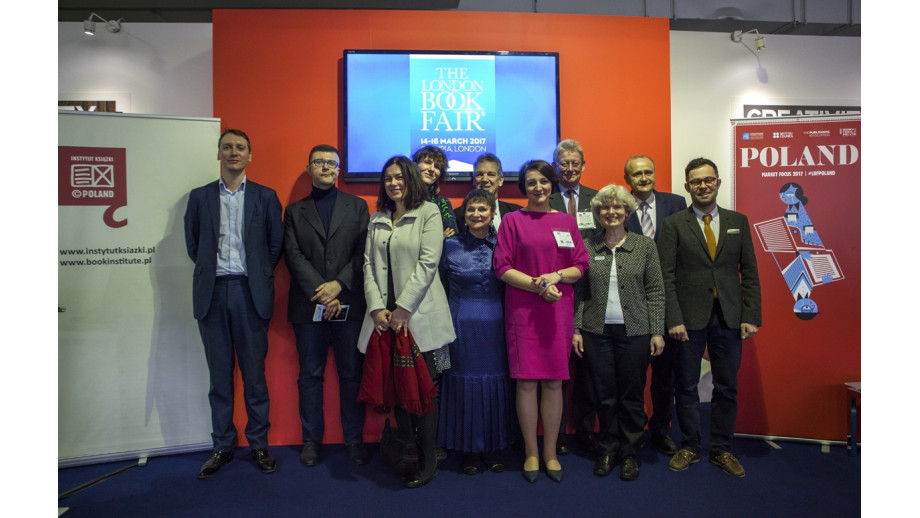News

Discussions on Polish detective literature, illustrated books, and the difficulties of the translator’s job inaugurated the first day of The London Book Fair, the most important spring book event in the world. On hand to speak about their work were Olga Tokarczuk, Zygmunt Miłoszewski, and Aleksandra and Daniel Mizieliński.
At the ceremonial opening of the fair, Vice-Minister of Culture and National Heritage Magdalena Gawin made an appearance, stressing that “if Polish culture is here, in Great Britain, it will be everywhere. English is the international language, used all over the world, and it is important that our culture make a stronger mark in it.”
The director of the The London Book Fair, Jacks Thomas, stated that Polish literature – which is at the heart of this year’s literary programme – "truly has everything: reportage, fiction, and children’s books, and now we can make it available to the entire world."
“You have brilliant detective novels, and also a long tradition of reportage. Great Britain has fallen in love with your book of maps by the Mizielińskis, which is sold in practically every bookstore. I also know Sapkowski and his Witcher series – and not only because it was nominated for our award for best adaptation from a book to a computer game," continued the head of the fair.
Book Institute director Dariusz Jaworski said that he hoped the “London fair would open a sort of window, or even a doorway to Polish culture." He added: “I hope that the number of translated books will grow and exceed the magic number of ten every year – though quality is always the main priority.”
During the morning session on contemporary Polish prose, Jacek Dehnel, Marzanna Bogumiła Kielar, and Moniza Alvi, a finalist for the prestigious T. S. Eliot Award, discussed the form and language that poets use as expression. In the second afternoon debate Zygmunt Miłoszewski and Olga Tokarczuk spoke with Amanda Jennings about whether it was reasonable to expect a fashion for Polish detective novels to catch on, and why they don’t see themselves as authors of mysteries, though they have written novels in the genre.
“This fair is unlike the ones we have in Poland. This is not a market for readers, it’s a place for doing business – publishers meet with publishers, and authors go to the ‘slaves’ galley’ to generate interest in themselves," Miłoszewski quipped.
“I’m in a comfortable situation, because I’m not in search of a publisher, I just came to promote Polish culture, which I admire. I think it’s cool, and worth celebrating (…) we have tons of great authors who write about Poland and Europe in a truly intelligent way," he added.
In another afternoon session, Aleksandra and Daniel Mizieliński and Marta Ignerska spoke about whether illustrations can cross borders, or if they are only understood and accepted in their country of origin. The success of the Mizielińskis’ Maps – which has sold over 3,000,000 copies in thirty-two countries worldwide – and the international awards that have showered upon Ignerska seem to indicate that Polish illustrators have found a way to make their work universal and well received outside of Poland.
Later, Ewa Winnicka – author of The Londoners and Brits – tested the skills of Marta Dziurosz and Sean Bye in a translation slam, a duel borrowed from rap culture, where the translators competed with time constraints, translating “live.”
“Polish immigrants don’t stick out of the crowd unless they have a mustache, but Great Britain really is an exotic country for them,” Winnicka explained, speaking to potential English-language publishers for her book at the fair.
“My book is is becoming even more topical than when I wrote it, because this group of Poles – a low estimate would be 800,000, a high one would be over a million – is a sensitive player in the politics following the Brexit referendum," she explained to Britons eager to learn about her work and about the Poles.
In the final Monday discussion, Zygmunt Miłoszewski spoke with his translator, Antonia Lloyd-Jones, about the role of the translator in creating a book: about how much depends on her, but also how many questions get asked during the course of the work.
Throughout the day, hungry book lovers were fed by the Polish food truck, which stood before Olympia Hall, serviced by Aleksander Baron, chef at Warsaw’s Solec 44 restaurant.
Visitors could try pickles, herring in linseed oil, Polish kimchi, beef tongue with horseradish, and borscht starter with wild fermentation. The cookbook that Baron wrote with Paweł Suwała was among eight of the world’s best in the Chef/Innovate category during the Gourmand World Cookbook Awards, the most important of its kind in the world. The competition will be decided in May in China.
Wednesday will see presentations by journalist Artur Domosławski, philosopher Dariusz Karłowicz, historian Andrzej Nowak, and writer Jacek Dukaj.
Jakub Krupa
Have a look at our London photo gallery.